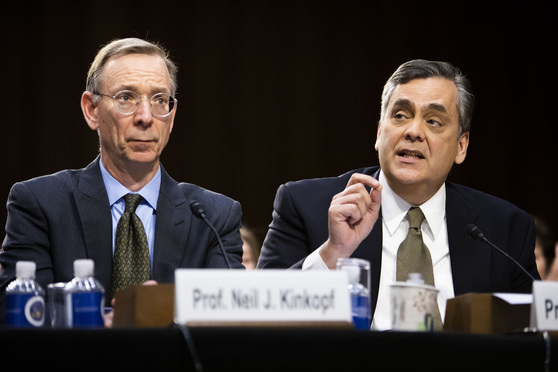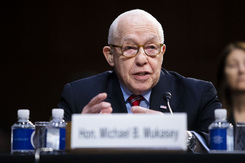Panel Questions If AG Candidate William Barr Would Snuff Robert Mueller's Findings
Wednesday's discussion also turned toward an unsolicited memo Barr sent to the Justice Department and other lawyers last June. The memo has fallen under scrutiny in part for Barr's comments criticizing a possible obstruction of justice inquiry as “fatally misconceived.”
January 16, 2019 at 04:28 PM
5 minute read
 Professors Neil J. Kinkopf, of Georgia State University College of Law in Atlanta, left, and Jonathan Turley, J.B. and Maurice C. Shapiro Professor of Public Interest Law at The George Washington University Law School in Washington, right, testify before the Senate Judiciary Committee during the confirmation hearing for U.S. Attorney General candidate William Barr on Wednesday, Jan. 16, 2019. Photo: Diego Radzinschi/ALM
Professors Neil J. Kinkopf, of Georgia State University College of Law in Atlanta, left, and Jonathan Turley, J.B. and Maurice C. Shapiro Professor of Public Interest Law at The George Washington University Law School in Washington, right, testify before the Senate Judiciary Committee during the confirmation hearing for U.S. Attorney General candidate William Barr on Wednesday, Jan. 16, 2019. Photo: Diego Radzinschi/ALM
The fate of a final report on special counsel Robert Mueller III's investigation took center stage at a Senate hearing Wednesday, as witnesses testifying on William Barr's nomination as U.S. attorney general debated his commitment to sharing Mueller's findings with the public.
The witness panel, featuring law professors, a former attorney general, and the leaders of civil rights groups, capped the nominee's two-day confirmation hearing, which was mostly dominated by the topic of Mueller's probe into Russian interference in the 2016 election.
Barr on Tuesday sought to assuage Democrats' concerns that he might undermine the probe, vowing to allow the special counsel to complete his work. But he signaled he might not release a full report on Mueller's findings to lawmakers and the public, only promising senators he would “provide as much transparency” as he could, consistent with Department of Justice regulations.
Barr later told Sen. Richard Blumenthal, D-Connecticut: “Under the current regulations, the special counsel report is confidential, and the report that goes public would be a report by the attorney general.”
Sen. Dianne Feinstein, the top Democrat on the Senate Judiciary Committee, said Wednesday she was concerned by Barr's “equivocation” on the matter of a final report. Feinstein said Barr's answer suggested he, at the conclusion of Mueller's probe, might only release a report prepared by the attorney general—rather than Mueller's findings—to lawmakers.
“I think it is essential that the American people know what is in the Mueller report,” Feinstein said, noting that she would follow up with the nominee in writing. She added: “I am hopeful that that report will be made public, and my vote depends on that.”
Echoing that concern on Wednesday was Neil Kinkopf, a law professor at Georgia State University's law school. Kinkopf said Barr made clear that he interpreted DOJ regulations to mean that he did not need to release Mueller's findings—only that he would release his own report.
Kinkopf predicted that “Barr will take the position that any discussion or release of the Mueller report—relating to the president, who again cannot be indicted—would be improper and prohibited by DOJ policy and regulations.”
Jonathan Turley, a professor at George Washington University's law school defended Barr's refusal to commit to full disclosure. He said Barr could not “commit in advance” to the release of information that he had not yet seen, because “part of his duty is to protect” things such as grand jury-related or privileged information. “He's duty-bound to review that,” Turley said in an exchange with committee Chairman Lindsey Graham, R-South Carolina.
“The only thing a nominee can say is that he is going to err on the side of transparency, and try to get as much of the report to Congress as possible,” Turley said.
Wednesday's discussion also turned toward an unsolicited memo Barr sent to the Justice Department and other lawyers last June. The memo has fallen under scrutiny in part for Barr's comments criticizing a possible obstruction of justice inquiry as “fatally misconceived.”
Barr had defended those comments during Tuesday's hearing, describing the memo as “narrow in scope” and focused on a single obstruction theory he believed Mueller might have been pursuing, rather than an attack on the special counsel investigation itself.
Still, Kinkopf argued the memo illustrated Barr's “alarming” views on executive power. Under the theory Barr espouses in his memo, Kinkopf warned, Trump would have the power to fire Mueller, terminate and tinker around with his probe, and more.
Defending Barr's integrity and independence Wednesday were two former top Justice Department officials: Larry Thompson, a former deputy attorney general during the George W. Bush administration and now counsel at Finch McCranie, called Barr's integrity “rock solid.”
 Michael B. Mukasey, former U.S. attorney general, and former U.S. district judge for the Southern District of New York, and now of counsel with Debevoise & Plimpton, testifies before the Senate Judiciary Committee during confirmation hearing for U.S. Attorney General candidate William Barr, on Wednesday, Jan. 16, 2019. Photo: Diego M. Radzinschi/ALM
Michael B. Mukasey, former U.S. attorney general, and former U.S. district judge for the Southern District of New York, and now of counsel with Debevoise & Plimpton, testifies before the Senate Judiciary Committee during confirmation hearing for U.S. Attorney General candidate William Barr, on Wednesday, Jan. 16, 2019. Photo: Diego M. Radzinschi/ALMBarr's “history of government service is simply without equal in suiting him to serve as attorney general,” said Michael Mukasey, former attorney general under Bush and now of counsel at Debevoise & Plimpton.
Also appearing at Wednesday's hearing were the heads of two of civil rights organizations: Derrick Johnson of the NAACP and Marc Morial of the National Urban League, who urged senators to reject Barr's bid, arguing civil rights enforcement could suffer under a Barr Justice Department.
Wednesday's panel also included former presidential speechwriter Mary Kate Cary, the Rev. Sharon Washington Risher, and Chuck Canterbury from the Fraternal Order of Police.
This content has been archived. It is available through our partners, LexisNexis® and Bloomberg Law.
To view this content, please continue to their sites.
Not a Lexis Subscriber?
Subscribe Now
Not a Bloomberg Law Subscriber?
Subscribe Now
NOT FOR REPRINT
© 2025 ALM Global, LLC, All Rights Reserved. Request academic re-use from www.copyright.com. All other uses, submit a request to [email protected]. For more information visit Asset & Logo Licensing.
You Might Like
View All
Government Attorneys Face Reassignment, Rescinded Job Offers in First Days of Trump Administration
4 minute read
RFK Jr. Will Keep Affiliations With Morgan & Morgan, Other Law Firms If Confirmed to DHHS
3 minute read
Am Law 200 Firms Announce Wave of D.C. Hires in White-Collar, Antitrust, Litigation Practices
3 minute readTrending Stories
- 1We the People?
- 2New York-Based Skadden Team Joins White & Case Group in Mexico City for Citigroup Demerger
- 3No Two Wildfires Alike: Lawyers Take Different Legal Strategies in California
- 4Poop-Themed Dog Toy OK as Parody, but Still Tarnished Jack Daniel’s Brand, Court Says
- 5Meet the New President of NY's Association of Trial Court Jurists
Who Got The Work
J. Brugh Lower of Gibbons has entered an appearance for industrial equipment supplier Devco Corporation in a pending trademark infringement lawsuit. The suit, accusing the defendant of selling knock-off Graco products, was filed Dec. 18 in New Jersey District Court by Rivkin Radler on behalf of Graco Inc. and Graco Minnesota. The case, assigned to U.S. District Judge Zahid N. Quraishi, is 3:24-cv-11294, Graco Inc. et al v. Devco Corporation.
Who Got The Work
Rebecca Maller-Stein and Kent A. Yalowitz of Arnold & Porter Kaye Scholer have entered their appearances for Hanaco Venture Capital and its executives, Lior Prosor and David Frankel, in a pending securities lawsuit. The action, filed on Dec. 24 in New York Southern District Court by Zell, Aron & Co. on behalf of Goldeneye Advisors, accuses the defendants of negligently and fraudulently managing the plaintiff's $1 million investment. The case, assigned to U.S. District Judge Vernon S. Broderick, is 1:24-cv-09918, Goldeneye Advisors, LLC v. Hanaco Venture Capital, Ltd. et al.
Who Got The Work
Attorneys from A&O Shearman has stepped in as defense counsel for Toronto-Dominion Bank and other defendants in a pending securities class action. The suit, filed Dec. 11 in New York Southern District Court by Bleichmar Fonti & Auld, accuses the defendants of concealing the bank's 'pervasive' deficiencies in regards to its compliance with the Bank Secrecy Act and the quality of its anti-money laundering controls. The case, assigned to U.S. District Judge Arun Subramanian, is 1:24-cv-09445, Gonzalez v. The Toronto-Dominion Bank et al.
Who Got The Work
Crown Castle International, a Pennsylvania company providing shared communications infrastructure, has turned to Luke D. Wolf of Gordon Rees Scully Mansukhani to fend off a pending breach-of-contract lawsuit. The court action, filed Nov. 25 in Michigan Eastern District Court by Hooper Hathaway PC on behalf of The Town Residences LLC, accuses Crown Castle of failing to transfer approximately $30,000 in utility payments from T-Mobile in breach of a roof-top lease and assignment agreement. The case, assigned to U.S. District Judge Susan K. Declercq, is 2:24-cv-13131, The Town Residences LLC v. T-Mobile US, Inc. et al.
Who Got The Work
Wilfred P. Coronato and Daniel M. Schwartz of McCarter & English have stepped in as defense counsel to Electrolux Home Products Inc. in a pending product liability lawsuit. The court action, filed Nov. 26 in New York Eastern District Court by Poulos Lopiccolo PC and Nagel Rice LLP on behalf of David Stern, alleges that the defendant's refrigerators’ drawers and shelving repeatedly break and fall apart within months after purchase. The case, assigned to U.S. District Judge Joan M. Azrack, is 2:24-cv-08204, Stern v. Electrolux Home Products, Inc.
Featured Firms
Law Offices of Gary Martin Hays & Associates, P.C.
(470) 294-1674
Law Offices of Mark E. Salomone
(857) 444-6468
Smith & Hassler
(713) 739-1250









